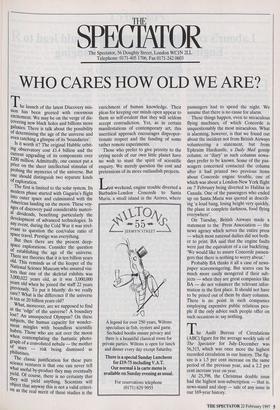SPEC I NTOR The Spectator, 56 Doughty Street, London WC1N 2LL Telephone:
0171-405 1706; Fax 0171-242 0603
WHO CARES HOW OLD WE ARE?
The launch of the latest Discovery mis- sion has been greeted with enormous excitement. We may be on the verge of dis- covering new black holes and billions more galaxies. There is talk about the possibility of determining the age of the universe and even catching a glimpse of its 'boundaries'. Is it worth it? The original Hubble orbit- ing observatory cost £1.4 billion and the current upgrading of its components over £200 million. Admittedly, one cannot put a price on the sheer intellectual stimulus of probing the mysteries of the universe. But One should distinguish two separate kinds of exploration.
The first is limited to the solar system. Its modern phase started with Gagarin's flight Into outer space and culminated with the American landing on the moon. These voy- ages of discovery paid considerable materi- al dividends, benefiting particularly the development of advanced technologies. In any event, during the Cold War it was irrel- evant to question the cost/value ratio of space travel. Prestige was everything. But then there are the present deep- space explorations. Consider the question of establishing the age of the universe. There are theories that it is ten billion years old. This reminds us of the keeper of the National Science Museum who assured visi- tors that one of the skeletal exhibits was 3,000,022 years old, as it was 3,000,000 years old when he joined the staff 22 years previously. To put it bluntly: do we really Fare? What is the difference if the universe is ten or 20 billion years old? What, moreover, are we supposed to find at the 'edge' of the universe? A boundary lost? An unsuspected Olympus? On these subjects, the human capacity for wonder- ment mingles with boundless scientific hubris. Those who are not over the moon when contemplating the fantastic photo- graph of a convoluted nebula — the mother of stars — risk being dismissed as philistines.
The classic justification for these pure science ventures is that one can never tell what useful by-product they may eventually yield. Of course, there is no certainty that they will yield anything. Scientists will object that anyway this is not a valid criteri- on as the real merit of these studies is the enrichment of human knowledge. Their pleas for keeping our minds open appear to them so self-evident that they will seldom accept contradiction. Yet, as in certain manifestations of contemporary art, this uncritical approach encourages dispropor- tionate respect and the funding of some rather remote experiments.
Those who prefer to give priority to the crying needs of our own little planet have no wish to stunt the spirit of scientific enquiry. We merely question the cost and pretensions of its more outlandish projects.
Last weekend, engine trouble diverted a Barbados-London Concorde to Santa Maria, a small island in the Azores, where passengers had to spend the night. We assume that there is no cause for alarm.
These things happen, even to miraculous flying machines, of which Concorde is unquestionably the most miraculous. What is alarming, however, is that we found out about the incident not from British Airways volunteering a statement, but from Ephraim Hardcastle, a Daily Mail gossip column, or 'diary' as such columns nowa- days prefer to be known. Some of the pas- sengers concerned contacted the column after it had printed two previous items about Concorde engine trouble, one of which was about a London-New York flight on 7 February being diverted to Halifax in Canada. One of the passengers who ended up on Santa, Maria was quoted as describ- ing 'a loud bang, losing height very quickly, the plane in complete darkness, food flying everywhere'.
On Tuesday, British Airways made a statement to the Press Association — the news agency which serves the entire press — which most national dailies did not both- er to print. BA said that the engine faults were just the equivalent of a car backfiring. We would like to assure Concorde passen- gers that there is nothing to worry about.'
Probably BA thinks it all a case of news- paper scaremongering. But scares can be much more easily mongered if their sub- jects — when they are great companies like BA — do not volunteer the relevant infor- mation in the first place. It should not have to be prised out of them by diary columns. There is no point in such companies employing expensive public relations peo- ple if the only advice such people offer on such occasions is: say nothing.
The Audit Bureau of Circulations (ABC) figure for the average weekly sale of The Spectator for July–December was 56,313, which was once more the highest recorded circulation in our history. The fig- ure is a 1.5 per cent increase on the same period of the previous year, and a 2.2 per cent increase year on year.
At 25,398, the Christmas double issue had the highest non-subscription — that is, news-stand and shop — sale of any issue in our 169-year history.


























































 Previous page
Previous page